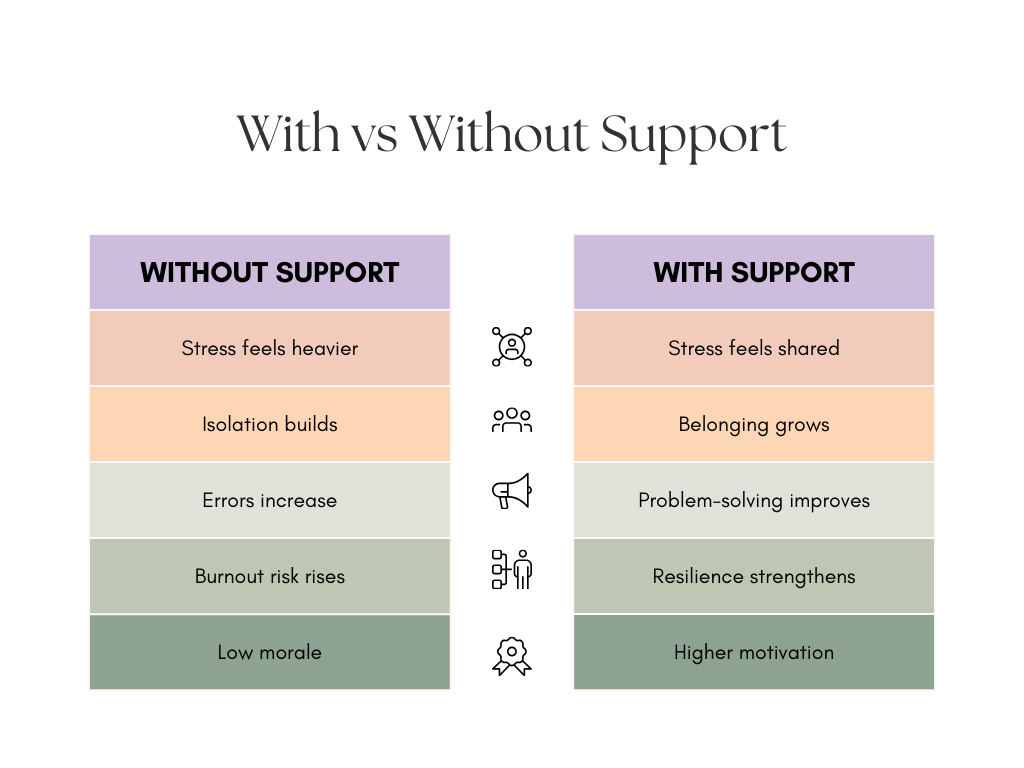Curriculum
MIND OVER CODE: Mental Health for Professionals
Module 1 – In My Head: Understanding the IT Mindset
0/4-
Lesson 1: Understanding Mental Health for IT Professionals
-
Lesson 2: Your Mind as the Most Important ToolThis lesson is locked because you haven't completed the previous one yet. Finish the previous lesson to unlock this one.
-
Lesson 3: Common “Bugs” in Your Mental SystemThis lesson is locked because you haven't completed the previous one yet. Finish the previous lesson to unlock this one.
-
Lesson 4: Spotting Early Warning SignsThis lesson is locked because you haven't completed the previous one yet. Finish the previous lesson to unlock this one.
Lesson 1: Understanding Mental Health for IT Professionals
Think of your mind like the most important piece of technology you’ll ever work with.
If it’s overloaded, ignored, or running without maintenance, eventually it will crash.
In IT, we spend so much time caring for systems but how often do we care for our own mental health?
WHY MENTAL HEALTH MATTERS IN IT
In the workplace, mental health isn’t just about avoiding illness it’s about how we think, feel, and perform. For IT professionals, this matters even more because of the unique demands of the job. Constant deadlines, overnight on-call duties, and the pressure to keep up with rapid tech changes make stress feel like a built-in feature of the role.

Mental health exists on a continuum; some days we’re thriving and engaged, other days we’re struggling to focus, and sometimes we edge toward burnout. Recognizing that this is a spectrum not an on/off switch helps us see that needing support is normal, not a weakness.
In IT, high stress and nonstop deadlines can take a toll on your mind.
Let’s understand why caring for mental health is key to thriving in tech.
In the fast-paced IT world, mental health shapes focus and productivity.
Let’s flip these cards to learn why it truly matters.
HOW THE WORK ENVIRONMENT SHAPES US
The environment we work in plays a big role. Open-plan offices can create noise and distraction, while remote work can leave us feeling isolated. Add in 24/7 connectivity emails, pings, project updates and suddenly work follows us everywhere.
Culture matters too. In a supportive workplace, managers check in on workload and peers encourage balance. In high-pressure cultures, silence is the norm and exhaustion goes unseen until it’s too late. The difference between these two cultures often determines whether employees thrive or burn out.
DIGITAL FATIGUE – THE SILENT STRAIN
One of the biggest hidden stressors in IT is digital fatigue. Constant notifications, juggling multiple tools, and “always-online” expectations wear the brain down. It feels like having too many programs running at once your mental processor slows, errors increase, and eventually you hit overload.
Information overload adds another layer. With new tools, frameworks, and certifications popping up constantly, professionals feel pressured to always “catch up.” This can create a sense of anxiety even when you’re performing well.
Managing digital fatigue isn’t about working less it’s about working smarter: protecting focus time, turning off non-essential notifications, and creating screen breaks.
Unlike traditional roles, IT rarely ends at 5 PM. Production issues, late-night releases, or “just one more bug fix” blur boundaries between work and personal life. Over time, this erodes rest and recovery, leaving professionals mentally and physically drained.
When mental health is supported, IT professionals are more creative, adaptable, and collaborative. Code is cleaner, problem-solving is sharper, and teamwork flows more smoothly. On the other hand, burnout leads to more mistakes, slower delivery, and frustration spreading across teams.
These aren’t “soft” issues they directly affect project outcomes and organizational success.
In the fast-paced world of IT, long hours and constant connectivity can drain your mind.
Let’s explore how digital fatigue impacts work-life balance and discover ways to boost your productivity.
Working long hours in front of screens can tire your mind and body.
Match the cards to learn simple tips to reduce digital fatigue and stay productive.
SIGNS OF GOOD MENTAL HEALTH IN IT
So, what does good mental health look like in our field?

- Adaptability – the ability to handle changing requirements without breaking down.
- Focus – maintaining concentration even with distractions around.
- Resilience – bouncing back from setbacks, like failed deployments or critical bugs.
- Collaboration – working with others without irritability or withdrawal.
These signs aren’t just personal strengths they’re professional assets in IT.
RESILIENCE & COPING IN IT ROLES
The truth is, stress isn’t going away. But resilience helps us respond differently. IT professionals can borrow from their technical skills: just as we debug code, we can debug stress through strategies like:
- Micro-breaks to recharge the brain during long coding sessions.
- Time-boxing to prevent endless overwork.
- Mindfulness or reframing to shift stressful tasks into challenges rather than threats.
- Asking for support instead of silently pushing through.
Coping well doesn’t mean ignoring stress it means balancing pressure with performance.
In the IT world, constant deadlines, long hours, and high pressure can affect your mind.
Understanding and caring for mental health is essential for success and well-being.
IT roles can be stressful with tight deadlines and constant changes.
Use the clues to guess the correct coping skills and build resilience.
THE ROLE OF SOCIAL SUPPORT AND TEAMWORK
No developer, tester, or engineer succeeds alone. Peer support, open communication, and mentorship are powerful buffers against stress. Simply knowing “someone has your back” reduces the risk of burnout.
Supportive teams create psychological safety spaces where it’s okay to admit struggles, share ideas, and ask questions without fear of judgment.
In the fast-paced IT world, the difference between working alone and having strong support can be dramatic. Let’s take a quick look at how social support and teamwork shape the mental well-being of professionals. Notice how the same pressures feel heavier without support, and how resilience builds when teams stand together.
Below is a simple comparison that shows how social support and teamwork can shape the mental health of IT professionals.
 Notice how the same challenges feel lighter when support systems are in place. This highlights why peer connections, mentorship, and open communication are essential for resilience in IT roles.
Notice how the same challenges feel lighter when support systems are in place. This highlights why peer connections, mentorship, and open communication are essential for resilience in IT roles.
MIND-BODY CONNECTION IN IT
The mental strain of IT is often reinforced by physical habits, such as sitting for long hours, staring at screens, and sleeping irregularly. Over time, these habits affect mood, concentration, and resilience. Taking care of physical health through movement, nutrition, and regular sleep is as important as any technical skill we learn.
The IT industry evolves at lightning speed. Today it’s cloud computing, tomorrow it’s AI and automation. This constant upskilling creates opportunity, but also anxiety: “Will my skills become obsolete?” or “Am I learning fast enough?”
Such pressures weigh heavily on mental well-being and require both personal resilience and organizational support.

Far from being a weakness, mental health is a competitive advantage. A clear mind leads to innovative solutions, ethical decision-making, and sustainable careers. IT professionals who care for their well-being are not only healthier they’re more valuable to their organizations.
But the responsibility can’t rest only on individuals. Organizations must create policies, awareness programs, and safe spaces where employees feel comfortable seeking help.
Still, stigma remains a barrier. Too many believe stress is “just part of IT” or that struggling makes you weak. These misconceptions silence professionals and keep them from accessing support. Breaking stigma is as vital as fixing bugs it improves the entire system.
As AI and automation reshape the industry, mental health will only grow in importance. For some, the future feels exciting, for others, uncertain. Either way, supporting mental well-being is not optional it’s the key to thriving in a rapidly evolving field.
Let’s watch a video on uncovering the hidden pressures behind the screens.
You’ll also hear Alex’s real story of how speaking up turned his burnout into a journey of recovery.
Based on Alex’s story and the lesson, can you choose the key step to prioritize mental health as an IT professional
At the end of the day, IT isn’t just powered by code, it’s powered by people. Our creativity, focus, and resilience are what make technology move forward. Mental health is not a side note; it’s the core system that keeps everything running. The more we protect it, the better we perform not just at work, but in life.
And that brings us to the next step.
If our mind is the engine behind all we do, how do we treat it?
Do we maintain it like we maintain servers, or do we let it run until it crashes?
In the next lesson, we’ll explore ‘Your Mind as the Most Important Tool’ understanding how your brain works, why it’s your greatest asset in IT, and how to care for it so it performs at its best.